Akiesha Anderson: Alabama’s grocery tax reduction: A penny saved, a better future paved

The first stop on the road to untaxing groceries in Alabama is straight ahead. Lawmakers achieved a significant victory for the people this year by passing legislation to cut the state’s 4-cent grocery tax by half. That change will begin this Labor Day weekend, as the first 1-cent reduction takes effect September 1. Ultimately, this small change likely will result in large savings for Alabamians who are working hard to make ends meet. Once the new law is fully implemented, many families will have hundreds of dollars more available each year to spend on food or other expenses. For decades, Alabama Arise has focused on reducing and ultimately eliminating the state sales tax on groceries, which essentially taxes survival. At the beginning of the 2023 legislative session, Alabama stood as one of only three states with no tax break on groceries. Thanks to determined advocacy by Arise members and other advocates, our state is off that shameful list at last. The story behind the legislative triumph Arise collaborated this year with many partners and lawmakers to introduce and pass the grocery tax reduction. That list includes the Alabama Grocers Association, Lt. Gov. Will Ainsworth, Sens. Andrew Jones and Merika Coleman, and Reps. Danny Garrett and Penni McClammy. This year’s breakthrough also would not have happened without other legislative champions who laid the groundwork for this moment, including former Reps. John Knight and Thad McClammy, former Sen. Hank Sanders and Reps. Laura Hall, and Mary Moore. The grocery tax law’s passage is a testament to the importance of continuing to hold the line and fight for change for as long as it takes. It’s also a testament to the importance of seizing the moment when opportunity arrives. Something spectacular happened this year as the stars finally aligned after decades of advocacy. When this year’s session began, many Alabamians were struggling with inflation and higher costs for essentials like eggs and bread. Simultaneously, the state was witnessing strong revenue growth. As elected officials began talking about one-time tax rebates, advocates recognized an opportune moment to make permanent progress on reducing the state grocery tax. And the revenue growth ensured this reduction would not cause severe harm to funding for our children’s public schools. A positive step forward State leaders seized this window of opportunity and united across partisan lines to reduce the grocery tax. It was amazing to witness the culmination of decades of hard work. And it was inspiring to see nearly every legislator co-sponsoring this monumental legislation. Many lawmakers tout this as the state’s largest tax cut ever, and it is one that will provide the biggest everyday benefit to people with low incomes. Ultimately, Alabama Arise remains dedicated to transforming the state’s regressive tax system into a more progressive one. Progressive tax systems levy taxes based on one’s ability to pay, whereas regressive systems work in the reverse. The grocery tax has long exemplified regressive taxation, burdening those with fewer resources by requiring them to pay proportionally more than wealthier individuals. Reducing the state grocery tax is a step in the right direction for tax justice. This penny saved is symbolic of a better future being paved for Alabama. What lies ahead Arise will continue advocating to eliminate the state grocery tax while protecting Education Trust Fund revenues. We look forward to working with the new Joint Study Commission on Grocery Taxation to find a sustainable path forward. Rebalancing Alabama’s upside-down tax system will require both lower taxes for people with low incomes and higher taxes for wealthy households and highly profitable corporations that can afford to pay more. As this year’s grocery tax reduction takes effect, we celebrate its many champions – most notably the Alabamians who stayed vigilant to ensure their voices translated into tangible policy improvements. We also celebrate this policy change as a symbol of progress and unity, and as a testament to what state leaders can accomplish when they put partisanship aside to pass legislation with profound benefits for individuals and communities. Cheers to eliminating the first cent, and to the ongoing journey toward a more prosperous and equitable Alabama! Akiesha Anderson is policy and advocacy director of Alabama Arise, a statewide, member-led nonprofit organization advancing public policies to improve the lives of Alabamians who are marginalized by poverty. Arise’s membership includes faith-based, community, nonprofit and civic groups, grassroots leaders, and individuals from across Alabama.
Supreme Court voting rights ruling stuns minority voters, who hope it expands their representation
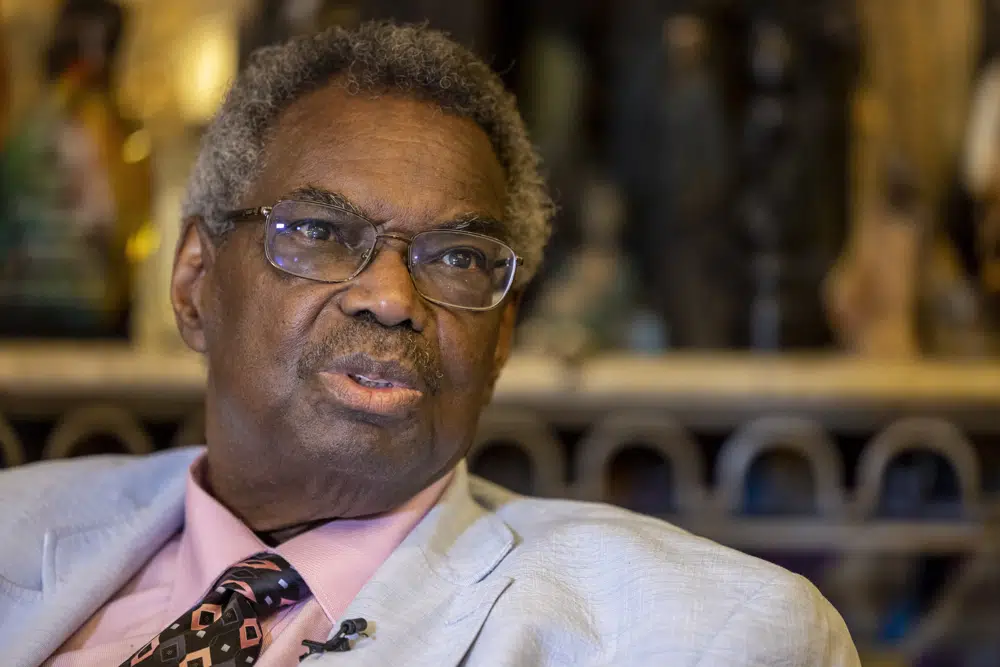
This week’s Supreme Court decision ordering Alabama to redraw its congressional districts was seen by many minority lawmakers and voting rights activists as a stunning victory with the potential to become a major stepping stone for undoing political maps that dilute the strength of communities of color. Hank Sanders, a former Alabama state lawmaker who has long been politically active in the state, knew there would be a decision since the court heard arguments in the case last fall. He was not anticipating being happy with the outcome, given that previous rulings of the conservative-leaning court had essentially gutted some of its most important provisions. “I was afraid they were going to go ahead and wipe out section 2,” he said, referring to the part of the Voting Rights Act at stake in the Alabama case. He was at his law office Thursday in Selma, scene of one of the most pivotal moments in the Civil Rights Movement, when news of the 5-4 ruling in favor of Alabama’s Black voters was announced. “It was a surprise that was good for my day,” he said. How the decision will affect similar lawsuits against political maps drawn in other states is unclear, although voting rights groups say the ruling provides firm guidance for lower courts to follow. The court majority found that Alabama concentrated Black voters in one district, while spreading them out among the others to make it much more difficult to elect more than one candidate of their choice. Alabama’s Black population is large enough and geographically compact enough to create a second district, the judges found. Just one of its seven congressional districts is majority Black, in a state where more than one in four residents is Black. Similar maps have been drawn in other states, primarily by Republican-controlled legislatures. Kareem Crayton, the Brennan Center’s senior director for voting and representation, called the court’s decision “a welcome surprise” and said challenges to the maps in Louisiana and Georgia were the most similar to the Alabama case. While it was considering the Alabama case, the Supreme Court had placed a hold on a lower court ruling in Louisiana allowing creation of a second majority-Black district. That’s now likely to be lifted. A federal judge last year also ruled that some of Georgia’s U.S. House and state legislative districts likely violated the Voting Rights Act, but he had allowed the districts to be used in the 2022 elections because it was too close to the election to redraw them. Maps in all three states could have to be redrawn for the 2024 elections. Louisiana Gov. John Bel Edwards, a Democrat, said in a statement that the court’s action reaffirmed his own belief that Louisiana’s map, which was drawn by the Republican-controlled Legislature, violated the law. “As I said when I vetoed it, Louisiana’s current congressional map violates the Voting Rights Act,” he said. “Louisiana’s voting population is one-third Black. We know that in compliance with the principles of the Voting Rights Act, Louisiana can have a congressional map where two of our six districts are majority Black.” Rep. Troy Carter, a Black Democrat representing Louisiana’s lone district that is majority Black, said the Legislature should immediately convene to draw a second majority-minority district. “This Supreme Court ruling is a win not just for Alabamians but for Louisianans as well,” Carter said in an emailed statement. “Rarely do we get a second chance to get things right — now Louisiana can.” In Georgia, Bishop Reginald Jackson, a plaintiff in one of the lawsuits challenging the state’s congressional map, said he was ecstatic when he heard the news about the ruling and hopes it will boost their case. He said he became involved in the lawsuit amid concerns that the state’s Black population had increased while the number of Black congressional representatives had decreased with the last round of redistricting. “So how could you have less Black representation when you have more Blacks moving into the state than before?” said Jackson, who presides over 534 African Methodist Episcopal churches in Georgia with over 90,000 parishioners The Alabama case, along with pending lawsuits in Georgia and Louisiana, means Black voters will likely have an opportunity to elect candidates in three additional districts, said Marina Jenkins, executive director of the National Redistricting Foundation, one of the organizations that has spearheaded voting rights challenges in the states. She said litigation in Texas by other plaintiff groups could mean additional seats there where minority voters “have the opportunity to elect candidates of their choice that don’t exist now.” Texas state Rep. Victoria Neave Criado, a Democrat who chairs the Mexican American Legislative Caucus, said the case was a “major win for voting rights.” She said following recent decisions by the current court in other areas she considers fundamental, such as last year’s overturning of the constitutional right to abortion, she was concerned about the direction the justices would take with voting rights and was relieved to see Thursday’s outcome. “As we are seeing the Latino community rise in many ways, we want to ensure that Latino power is translated into Latino political power,” Neave Criado said. Latinos and whites share an equal proportion of the Texas population, about 40% each, according to 2022 Census figures. Nina Perales, vice-president of litigation with the Mexican American Legal Defense and Educational Fund, said the ruling closes the door on Texas using arguments similar to those made by Alabama as the cases there go forward. Perales leads the litigation for a similar case out of Texas, which is based on the redistricting maps created in 2021. In addition to the Voting Rights Act challenge to Texas’ congressional districts, similar section 2 claims have been brought against numerous voting districts used for state legislatures and local governments around the country. Attorney Mark Gaber argued a case this week alleging Washington’s state legislative districts diluted the voting strength of Hispanic residents and will be arguing a similar case next week involving Native Americans and North Dakota’s state legislative districts. He thinks Thursday’s ruling will strengthen the case. In Alabama, the question
Black representation in Alabama tested before Supreme Court
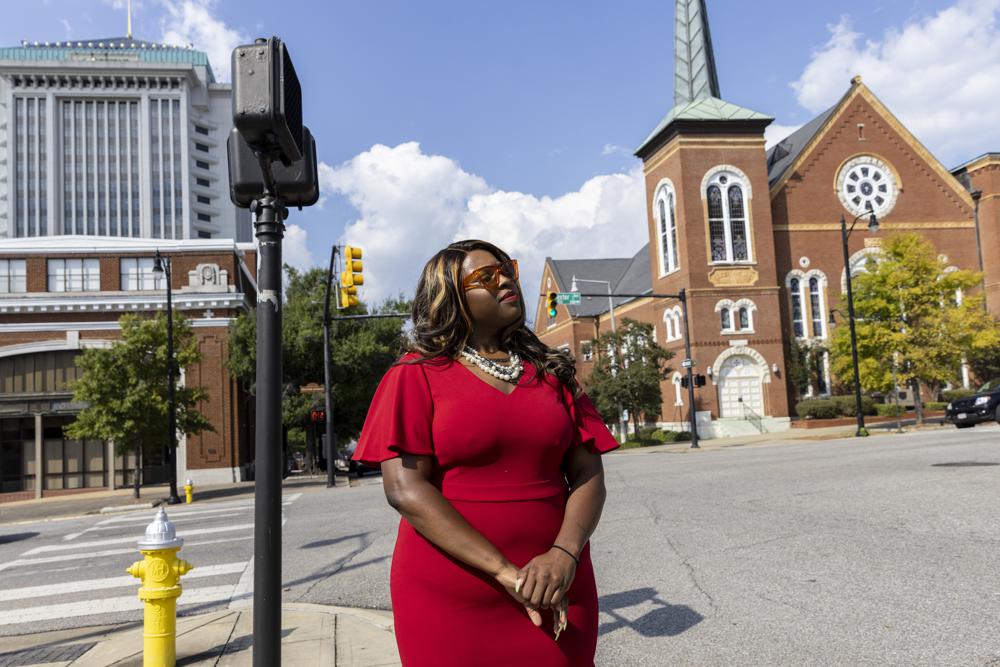
The invisible line dividing two of Alabama’s congressional districts slices through Montgomery, near iconic sites from the civil rights movement as well as ones more personal to Evan Milligan. There’s the house where his grandfather loaded people into his station wagon and drove them to their jobs during the Montgomery Bus Boycott as Black residents spurned city buses to protest segregation. It’s the same home where his mother lived as a child, just yards from a whites-only park and zoo she was not allowed to enter. The spot downtown where Rosa Parks was arrested, igniting the boycott, sits on one side of the dividing line, while the church pastored by the Rev. Martin Luther King Jr., who led the protests, sits on the other. The lines are at the center of a high-stakes redistricting case bearing Milligan’s name that will go before the U.S. Supreme Court on Tuesday, setting up a new test of the Voting Rights Act and the role of race in drawing congressional boundaries. At the center of the case is a challenge by various groups arguing that the state violated the federal Voting Rights Act by diluting the political power of Black voters when it failed to create a second district in which they make up a majority, or close to it. African Americans account for about 27% of the state’s population but are the majority in just one of the state’s seven congressional districts. “Our congressional map is not reflective of the population that lives in Alabama,” said Milligan, 41, one of several voters who joined interest groups in filing the lawsuit. The case the Supreme Court will take up Tuesday centers on whether congressional districts in Alabama were drawn to reduce the political influence of Black voters, but it’s also part of a much broader problem that undermines representative government in the U.S. Both major political parties have practiced gerrymandering — drawing congressional and state legislative boundaries to cement their hold on power — but Republicans have been in control of the process in far more states since after the 2010 elections. That has allowed them to win an outsized share of statehouse and U.S. House seats and means GOP policies — including on abortion restrictions — often don’t reflect the will of most voters. An Associated Press analysis from 2017 showed that Alabama had one of the most gerrymandered congressional maps in the country. Republicans dominate elected office in Alabama and are in charge of redistricting. They have been resistant to creating a second district with a Democratic-leaning Black majority that could send another Democrat to Congress. A three-judge panel that included two appointees of President Donald Trump ruled unanimously in January that the Alabama Legislature likely violated the Voting Rights Act with the map. “Black voters have less opportunity than other Alabamians to elect candidates of their choice to Congress,” the panel said. The judges ordered state lawmakers to draw new lines for this year’s election and create a second district where Black voters either made up a majority or near majority of the population. But on a 5-4 vote in February, the Supreme Court sided with Alabama to allow this year’s congressional elections to take place without adding a second predominantly Black district. Two justices suggested it was too close to spring primaries to make a change. The lawsuit claims the Alabama congressional map dilutes the voting strength of Black residents by packing a large number of them into a single district — the 7th, where 55% of voters are Black — while fragmenting other communities. That includes the state’s Black Belt region and the city of Montgomery. The current districts leave the vast majority of Black voters with no realistic chance to elect their preferred congressional candidates anywhere outside the 7th district, the lawsuit contends. “This is just about getting Black voters, finally, in Alabama, the opportunity to elect their candidates of choice. It’s not necessarily guaranteeing that they will have their candidate elected,” said Deuel Ross, senior counsel at the NAACP Legal Defense and Educational Fund, which is representing the plaintiffs. The groups contend that the state’s Black population is large enough and geographically compact enough to create a second district. Milligan, who is six generations removed from enslaved ancestors who lived in the Black Belt, ticked off the consequences for Black residents who are not able to have representation that aligns with their needs: addressing generational poverty, the lack of adequate internet service, Medicaid expansion and the desire for a broader array of health care services. “In choosing not to do that, you’re denying the people of the Black Belt the opportunity to elect an additional person that can really go to the mat on their interests,” said Ross, who is one of the attorneys who will argue the case in a challenge backed by the Biden administration. African Americans served in Alabama’s congressional delegation following the Civil War in the period known as Reconstruction. They did not return until 1993, a year after the courts ordered the state to reconfigure the 7th Congressional District into a majority-Black one, which has since been held by a succession of Black Democrats. That 1992 map remains the basis for the one in use today. “Under numerous court challenges, the courts have approved this basic plan. All we did is adjust it for population deviation,” said state Rep. Chris Pringle, a Republican and chairman of the legislative committee that drew the new lines. Alabama argued in court filings that the state’s Black population is too spread out to be able to create a second majority district without abandoning core redistricting principles such as keeping districts compact and keeping communities of interest together. Drawing such a district, the state argued, would require mapping acrobatics, such as connecting coastal areas in southwest Alabama to peanut farms in the east. In a statement to The Associated Press, Alabama Attorney General Steve Marshall said the map is “based on race-neutral redistricting principles that were approved by a bipartisan group of legislators.” He said it looks similar to
Seven State Senate seat races to watch
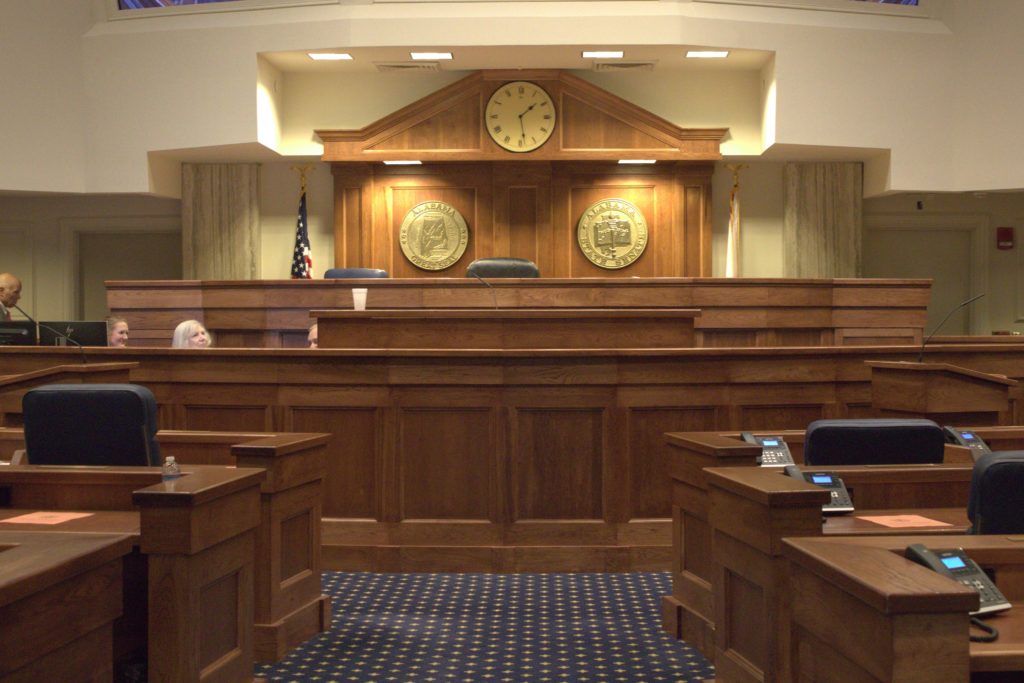
All 35 State Senate seats are up for grabs in the November 8 general election. Republicans hold a 27 to 8 margin over Democrats in the current makeup of the Alabama Senate. The Alabama Republican Party is running candidates in 29 seats. The GOP is defending all of the 27 seats they currently hold and are running candidates in two districts currently held by Democrats. Alabama Democrats are defending the eight seats they currently hold and are challenging the GOP in six districts currently held by Republicans. Libertarians currently hold no seats in the Alabama Senate but are running twelve candidates in State Senate races. There are a number of contested State Senate races on the November ballot. These are the seven races with the most chance of becoming interesting. Democrat Lisa Ward is challenging Republican incumbent State Sen. Gerald Allen in Senate District 21. Both of these candidates are well known in the Tuscaloosa area. Allen has represented the district for three terms and served in the Alabama House of Representatives before that. Ward is a former city councilwoman who is very active in the community. According to filings with the Alabama Secretary of State’s office, Allen has a $204,872.68 campaign account balance entering September, which includes August contributions of $8,250. Ward, the challenger, meanwhile raised $23,149.76 in August and has a cash balance of $31,968.94 entering September. Neither faced a primary opponent. Democrat Kim Lewis versus Republican incumbent State Sen. Tom Butler in Senate District 2. Butler has represented Madison County in the legislature for parts of five decades, but this is one of the fastest growing areas in the state, and there are thousands of new people that bring different politics with them to the area. Lewis is hoping that an increasingly purple Madison County will result in a win. Butler was pushed hard in the Republican primary by former State Sen. Bill Holtzclaw. Butler raised $44,500 in the month of August and enters September with $38,166.63. Lewis raised $7,830 in August and comes into September with $27,859.70. In Senate District 33, incumbent Democratic Sen. Vivian Figures faces Republican challenger Pete Riehm. This has been a very safe Democratic district consisting of the poorest parts of Mobile as well as Mobile County suburbs like Prichard, but redistricting meant that the new district now goes deep into Baldwin County and picked up the very prosperous and heavily Republican community of Spanish Fort. This district went from very blue to purple thanks to the legislature’s redistricting and efforts to “unpack” Black voters from majority-minority districts. Is it purple enough for a Republican to take it away from the Democrats? That is for the voters to decide on November 8. Sen. Figures raised $31,500 in the month of August to enter September with $110,497.02. Riehm had contributions of $19,577.54 in August and enters September with $60,911.31. Democrat Sherri Lewis versus Republican Jay Hovey in Senate District 27. Hovey, an Auburn City Councilman, just narrowly defeated incumbent Tom Whatley (R-Auburn) in a heavily contested GOP primary. Hovey, who has the challenge of unifying Republicans, raised $85,500 in contributions in August to enter September with a cash balance of $70,074.17. Reese meanwhile raised $1,806.20 in August to bring a total of $2,703.33 into the month of September. Senate District 23 – here, there are three candidates vying for the open seat formerly held by State Sen. Malika Sanders-Fortier, who vacated the seat in an unsuccessful bid for governor. Democrat Robert Lee Stewart narrowly defeated former State Sen. Hank Sanders in a hard-fought Democratic primary runoff in June. Stewart faces both a Republican in Michael Nimmer and a Libertarian in Portia Stephens. Stewart raised $16,987 in August to bring $17,872.84 into September. The Libertarian, Stephens, reported raising $2,060 in August to finish the month with $6,285 in cash on hand. The Republican, Nimmer, has not filed a campaign finance report. Alabama does not have general election runoffs, so when there are multiple candidates, the candidate with the most votes wins even if they got less than half of the votes. There is another three-way contest in Senate District 29. There, incumbent Republican Sen. Donnie Chesteen (R-Dothan) faces both Democrat Nathan “Nate” Mathis and Libertarian Floyd “Pete” McBroom. Matthis reported raising no money in August, but he has $5,719.36 in cash on hand. McBroom has not filed a campaign finance report with the Secretary of State’s office yet. The incumbent, Chesteen, raised $25,500 in August to enter September with $327,660.86. In Senate District 12, Republican Keith Kelley is battling Democrat David McCullars for the open seat currently held by Sen. Del Marsh. Kelley raised $29,658.24 in August and has $65,102.13 in cash on hand. McCullars only raised $265 in the month of August and entered the month of September with $4,377.15 in cash on hand. Kelley had a hard-fought Republican primary. This is a district that has given Marsh a close call in the 2014 general election. In other contested Alabama Senate races · SD3 incumbent Arthur Orr (R-Decatur) faces Libertarian Rick Chandler · SD4 incumbent Garlan Gudger (R-Cullman) faces Libertarian Jacob Marlow · SD6 incumbent Larry Stutts (R-Sheffield) faces Libertarian Kyle Richard-Garrison · SD7 incumbent Sam Givhan (R-Huntsville) faces Democrat Korey Wilson · SD15 incumbent Dan Roberts (R-Mountain Brook) faces Libertarian Michael Crump · SD17 incumbent Shay Shelnutt (R-Trussville) faces Libertarian John Fortenberry · SD24 incumbent Bobby Singleton (D-Greensboro) faces Libertarian Richard Benderson · SD25 incumbent Will Barfoot (R-Montgomery) versus Libertarian Louie Woolbright · SD28 incumbent Billy Beasley (D-Clayton) faces Libertarian David Boatwright · SD35 incumbent David Sessions (R-Grand Bay) faces Libertarian Clifton Hudson Republican incumbents Tim Melson, Greg Reed, Steve Livingston, Clay Scofield, Andrew Jones, Randy Price, April Weaver, Jabo Waggoner, Greg Albritton, Clyde Chambliss, Chris Elliott, and Jack Williams are all running unopposed. Republican newcomers Lance Bell in SD11 and Josh Carnley in SD31 are also unopposed in the general election. Democratic incumbents Rodger Smitherman, Linda Coleman-Madison, and Kirk Hatcher are all also unopposed in the general election. State Rep. Merika Coleman is unopposed in SD19, which is being vacated by the retirement of Priscilla Dunn (D-Bessemer). In 2022 Republican candidates in Alabama have received $44,321,108.97 in contributions. Political Action Committees have received $17,846,761.05. Democratic candidates have received $6,629,199.43, and all other candidates have received just $111,950.87. The general
Steve Flowers: Women and young folks prevail in 2022

In my observations of Alabama politics, every election year brings an underlying election year surprise or two. The underlying prevailing theme emerging from the Alabama political arena this year is that women have arrived politically in the Heart of Dixie. Governor Kay Ivey is only the second female elected Governor of Alabama, Lurleen Wallace being the first in 1966. Governor Ivey won a decisive second-term nomination as the Republican nominee in May. She will face another female Democratic nominee, Yolanda Flowers, in the November General Election. This is the first time two women will face each other for governor. In fact, the first and second place finishers in both the Republican and Democratic primaries were women. Governor Ivey was followed by Lindy Blanchard, who finished second in the GOP primary. Dr. Yolanda Flowers, a retired Birmingham educator, was in a runoff with second place Democratic female State Senator Malika Sanders Fortier in the Democratic primary. Katie Britt emerged victoriously from the Republican U.S. Senate contest, and if elected in November, as is expected, she will be the first female elected to the U.S. Senate from Alabama. Katie Britt is the brightest young star in Alabama politics. She is the new rock star of the state. Not only will she be the first female senator, but she is also the headliner for the second theme of 2022. That is, we have a pair of new youthful stars arriving on the scene as the dust settles from the June 21 runoffs. Wes Allen and Andrew Sorrell have become the new stars on the scene. Wes Allen defeated veteran politico Jim Ziegler in the Secretary of State race. Andrew Sorrell bested Stan Cooke and Rusty Glover to become State Auditor. Both Sorrell and Allen were about to become freshmen members of the Alabama House this time four years ago. Now, they are the new stars on the statewide political block. They will be joining Lieutenant Governor Will Ainsworth as young constitutional officeholders with a future. You have four young stars on the horizon in the state. Rockstar Katie Britt is 40, superstar Will Ainsworth is 41, star Wes Allen is 46, and star Andrew Sorrell is 36. Another young superstar has arrived on the behind-the-scenes political consulting arena in Alabama politics. Twenty-seven-year-old Sean Ross ran the Katie Britt campaign masterfully. He is absolutely brilliant. He ran one of Twinkle Cavanaugh’s campaigns four years ago when he was just graduating from the University of Alabama. Katie did a good day’s work when she acquired his services with a recommendation from Twinkle. He is the hottest item in Alabama political consulting. There were four vacancies in the Alabama State Senate. State Representative Merika Coleman, a Bessemer attorney, won a very impressive victory for the seat of retiring Priscilla Dunn. She is young and brilliant and is going to be a star in the Alabama State Senate. Lance Bell won the seat of retiring state Senator Jim McClendon. Bell beat his opponent 73% to 27% in this Republican seat. Keith Kelley emerged victorious over Wendy Ghee Draper, in the Anniston-based Republican seat of retiring veteran state Senator Del Marsh. In probably the biggest upset surprise of the 2022 primary season was the victory of Josh Carnley to fill the Republican Southeast Alabama Senate Seat held for decades by the powerful and popular Jimmy Holley. This district is comprised of Coffee, Covington, Pike, and part of Dale counties. Twelve-year veteran State House member Mike Jones of Andalusia was expected to waltz to victory having every business group’s endorsement. Carnley carried his home county of Coffee overwhelmingly, and veteran political consultant David Mowery did a masterful job with Carnley’s ads. Popular first-term state senator, Dan Roberts, was challenged by a self-financed urologist in Roberts’ silk stocking Jefferson/Shelby district, but Roberts won handily. For the first time in 40 years, there will not be a Sanders representing the Black Belt in the Alabama Senate. Veteran Senator Hank Sanders failed in his bid to take back his seat he loaned to his daughter, the aforementioned Malika Sanders Fortier. Hank Sanders had served nine terms as the Black Belt’s senator. He was defeated by Robert Stewart of Selma. Jay Hovey won the coveted Lee/Tallapoosa/Russell County State Senate seat, prevailing over incumbent Tom Whatley by one vote. For the most part, the powerful 35-member State Senate will return intact with only a few new faces. See you next week. Steve Flowers is Alabama’s leading political columnist. His weekly column appears in over 60 Alabama newspapers. He served 16 years in the state legislature. Steve may be reached at www.steveflowers.us.
Wes Allen wins GOP nomination for Secretary of State, Dem gubernatorial nominations set

Voters selected the Republican nominee for Alabama’s top election official in the runoff Tuesday, and the general election race for governor was set as Democratic voters picked their gubernatorial nominee. Three other statewide races plus a U.S. House nomination also were on the ballot. Here is a look at the races: SECRETARY OF STATE State Rep. Wes Allen won the Republican nomination for secretary of state on Tuesday in contest that featured both candidates promoting the need to tighten election security in harmony with former President Donald Trump’s false claims that he lost the 2020 presidential race because of fraud. Allen defeated outgoing State Auditor Jim Zeigler and will face Democrat Pamela J. Laffitte, an Air Force veteran and corrections supervisor in Mobile County, in the general election to become Alabama’s top election official. Zeigler received the most votes among four candidates in the primary election in May, but Allen overcame the deficit. Allen, from Troy, previously served as probate judge in Pike County. Citing the potential for fraud, he opposed early voting and no-excuse absentee balloting and sponsored a law that barred “curbside” voting meant in part to make it easier for people with disabilities to cast a ballot. During the campaign, Zeigler dubbed himself a “watchman” against ballot fraud, so-called “ballot harvesting” and voting by mail. Trump has blamed all those and more for his loss to Democratic President Joe Biden, and many GOP voters believe him despite a lack of evidence. The current secretary of state, Republican John Merrill, couldn’t run again because of term limits, and the GOP nominee will be a heavy favorite to win in November. GOVERNOR Yolanda Rochelle Flowers defeated state Sen. Malika Sanders Fortier in the Democratic race for governor to become the first Black person to win a major party’s gubernatorial nomination in Alabama. Flowers, a career educator from Birmingham, narrowly led a six-person field in the May primary. In what will be the state’s first all-female gubernatorial race, she will be a decided underdog against Gov. Kay Ivey, who vanquished eight challengers to win the GOP primary without a runoff. Almost four times as many people voted in the Republican primary as the Democratic primary in May, and Republicans hold every statewide office. Flowers ran on a platform of “reconstructing” Alabama by rebuilding its economy and systems for education, health care, and criminal justice. Among other things, she advocated for a state lottery and a state minimum wage of $15. Fortier, a state lawmaker from Selma, campaigned on the theme of building the biblical “beloved community” promoted by the Rev. Martin Luther King Jr. by improving the state’s economy, schools, and health care. She is the daughter of former state Sen. Hank Sanders and attorney Faya Rose Toure. STATE AUDITOR Andrew Sorrell claimed the GOP nomination for state auditor by defeating Stan Cooke, a win that was tantamount to election since there’s no Democratic contender for the office. Sorrell, a state representative from Colbert County who led balloting in the May primary, tried to make election security a prime issue, saying a strong auditor is needed to appoint county registrars who will keep voter rolls clean. Cooke, a pastor from the Jefferson County town of Kimberly, claimed Alabama is at a crossroads where it could remain a conservative state or come under the control of liberal Democrats. Echoing Trump’s false claims of election theft, he highlighted the auditor’s role in appointing county election officials who can prevent Democrats from stealing elections. The current auditor, Republican Jim Zeigler, was barred from seeking another term. U.S. HOUSE Madison County Commission chair Dale Strong won the only runoff among the state’s seven U.S. House seats, claiming the Republican nomination for an open position in north Alabama’s 5th District. Strong defeated Casey Wardynski, a former Huntsville school superintendent. Strong handily led a six-candidate field with about 45% of the primary vote in May but couldn’t avoid a runoff. Strong will face Democrat Kathy Warner-Stanton of Decatur in the mostly Republican Tennessee Valley district in November. The seat was given up by U.S. Rep. Mo Brooks, who lost a runoff race with former business lobby leader Katie Britt for the seat being vacated by U.S. Sen. Richard Shelby. ALABAMA PUBLIC SERVICE COMMISSION Two Republican incumbents on the Alabama Public Service Commission faced challenges to keep their jobs on the utility-regulating board, and at least one won. Chip Beeker, a former Greene County commissioner first elected to the PSC in 2014, defeated Robert L. McCollum to win the GOP nomination for Place 2. Beeker portrayed himself as an opponent of Democratic environmental policies, while McCollum, a small business owner from Tallapoosa County, argued the commission is too close to Alabama Power Co. Jeremy Oden, a former state legislator from Cullman seeking his third term on the three-member commission, cast himself as a conservative bulwark against liberal environmental policies. He received the most votes in May in a four-way race for the Place 1 seat that saw attorney Brent Woodall, a PSC staffer, and Republican activist, come in second. No Democrat qualified for either position, making a victory in the Republican runoff tantamount to election. Republished with the permission of The Associated Press.
A look at nominations for five statewide offices

The party nominations for five statewide offices, including secretary of state on the Republican side and governor on the Democratic ticket are on the ballot in Tuesday’s primary runoff election in Alabama. The GOP nomination for a lone congressional seat also will be decided. Here is a look at the races: SECRETARY OF STATE With many Republican voters embracing former President Donald Trump’s false claims that fraud cost him the 2020 presidential election, the two remaining GOP candidates to become Alabama’s top elections official, secretary of state, campaigned on themes of tightening election security. Jim Zeigler, who was barred from seeking another four years as state auditor because of term limits, dubbed himself a “watchman” against ballot fraud, so-called “ballot harvesting,” and voting by mail. Trump has blamed all those and more for his loss to Democratic President Joe Biden, and many GOP voters believe him despite a lack of evidence. Rep. Wes Allen is a state representative from Troy who previously served as probate judge in Pike County. Citing the potential for fraud, he opposes early voting and no-excuse absentee balloting and sponsored a law that barred “curbside” voting meant in part to make it easier for people with disabilities to cast a ballot. The Republican nominee will face Democrat Pamela J. Laffitte, an Air Force veteran and corrections supervisor in Mobile County, in November. The current secretary of state, Republican John Merrill, couldn’t run again because of term limits. GOVERNOR Either Yolanda Rochelle Flowers or state Sen. Malika Sanders Fortier will become the first Black person to win a major party’s gubernatorial nomination in Alabama in the Democratic runoff for governor. Flowers, a career educator from Birmingham, narrowly led a six-person field in the May primary. She ran on a platform of “reconstructing” Alabama by rebuilding its economy and systems for education, health care, and criminal justice. Among other things, she has advocated for a state lottery and a state minimum wage of $15. Fortier, a state lawmaker from Selma, campaigned on the theme of building the biblical “beloved community” promoted by the Rev. Martin Luther King Jr. by improving the state’s economy, schools, and health care. She is the daughter of former state Sen. Hank Sanders and attorney Faya Rose Toure. The eventual winner face Gov. Kay Ivey, who vanquished eight challengers to win the GOP primary without a runoff. Nearly four times as many people voted in the Republican primary as the Democratic primary in May, and Republicans hold every statewide office. STATE AUDITOR Stan Cooke and Andrew Sorrell are vying for the Republican nomination to succeed Zeigler as state auditor. Cooke, a pastor from the Jefferson County town of Kimberly, claims Alabama is at a crossroads where it could remain a conservative state or come under the control of liberal Democrats. Echoing former President Donald Trump’s false claims of election theft, he is highlighting the auditor’s role in appointing county election officials who can prevent Democrats from stealing elections. Sorrell, a state representative from Colbert County who led balloting in the May primary, also tried to make election security a prime issue, saying a strong auditor is needed to appoint county registrars who will keep voter rolls clean. The eventual nominee will not have a Democratic opponent in the fall. U.S. HOUSE North Alabama’s 5th District features the only runoff for one of the state’s seven U.S. House seats. In the Tennessee Valley region, Madison County Commission chair Dale Strong and Casey Wardynski, a former Huntsville school superintendent, advanced to a runoff from a field of six candidates in May. Strong led easily with about 45% of the vote but couldn’t avoid a runoff. The winner will face Democrat Kathy Warner-Stanton of Decatur. The 5th District seat is being given up by U.S. Rep. Mo Brooks, who is in a runoff with former business lobby leader Katie Britt for the seat being vacated by U.S. Sen. Richard Shelby. ALABAMA PUBLIC SERVICE COMMISSION Two Republican incumbents on the Alabama Public Service Commission face runoff challenges to keep their jobs on the utility-regulating board. Jeremy Oden, a former state legislator from Cullman seeking his third term on the three-member commission, cast himself as a conservative bulwark against liberal environmental policies. He received the most votes in May in a four-way race for the Place 1 seat that saw attorney Brent Woodall, a PSC staffer, and Republican activist, come in second. First elected to the PSC in 2014, former Greene County Commissioner Chip Beeker also portrayed himself as an opponent of Democratic environmental policies in his campaign to retain the Place 2 seat. Beeker, who led the primary vote, is opposed by Robert L. McCollum, a small business owner from Tallapoosa County who contends the commission is too close to Alabama Power Co. No Democrat qualified for either position, making a victory in the Republican runoff tantamount to election.
Several Alabama legislators lose to primary challengers

At least six members of the Alabama Legislature lost to primary challengers on Tuesday, according to unofficial returns, and several races are yet to be decided. In one of the tightest races, Republican Sen. Tom Whatley of Auburn is trailing challenger Jay Hovey by four votes, according to unofficial returns. Provisional ballots will be counted next week. Hovey is a member of the Auburn City Council. In the House of Representatives, Rep. Will Dismukes of Prattville lost to challenger Jerry Starnes. His defeat came after a series of political and legal troubles. Dismukes had faced calls for his resignation in 2020 after participating in a celebration marking the birthday of Nathan Bedford Forrest — the Confederate general who was also an early Ku Klux Klan leader. He also faced a theft charge related to a dispute with a former employer. Other incumbent defeats, according to unofficial returns, included: — Republican Rep. Joe Faust of Fairhope, a 20-year veteran of the House was defeated by Jennifer Fidler. — Republican Rep. Dickie Drake of Leeds was defeated by Susan DuBose. — Republican Rep. Tommy Hanes of Bryant was defeated by Mike Kirkland. — Republican Rep. Proncey Robertson of Mount Hope was defeated by Ernie Yarbrough. — Democratic Rep. Ralph Howard of Greensboro was defeated by Curtis Travis. Republican Rep. Gill Isbell of Gadsden is trailing challenger Mack Butler, who previously served in the Legislature. But the race is caught in a mix-up where some voters got ballots with the wrong House district. Secretary of State John Merrill said they did not know how many voters were affected. Democratic Rep. Rod Scott of Fairfield was forced into a runoff with a challenger. In another notable contest, House Rules Chair Mike Jones, one of the most influential members in the House of Representatives, appears to have lost to Coffee County Commissioner Josh Carnley in his bid to join the Alabama Senate. Unofficial returns showed Carnley avoiding a runoff with Jones by a margin of about 50 votes. The two are seeking the GOP nomination for the state Senate seat being vacated by retiring Sen. Jimmy Holley. Former longtime state Sen. Hank Sanders of Selma will go to a runoff with Robert L. Stewart for the Democratic nomination for District 23. Sanders represented the district from 1982 to 2018. His daughter, Sen. Malika Sanders-Fortier, won the seat in 2018 but is leaving the state Senate to run for governor. Republished with the permission of The Associated Press.
Steve Flowers: Incumbency reigns supreme in State Senate

Being an incumbent state senator in Alabama is like owning that seat. The level of re-electability odds is probably better than that of an incumbent congressman, which is about the same as being elected to a seat in the Russian Communist Politburo. Being a freshman state senator in Alabama is a more powerful position than being a freshman U.S. congressman, especially if you want to affect public policy. Many times, a 50-year old, successful person who is interested in seeking a representative role will approach me and seek my advice about running for either a state senate seat or an open congressional seat. I will quickly advise them that as a state senator, you are one of 35, and you immediately have an impact on your first year as a state senator. However, if you win a congressional seat, you are one of 435. Because of the seniority system, it will be 15 years before they know your name in Washington and 25 years before you are chairman of a committee, and then it is time to retire. In the 35-member Alabama Senate, there are 27 Republicans and 8 Democrats – a pretty supermajority for the GOP. Twenty-four of the twenty-seven senate Republicans are running for reelection. Republicans Jimmy Holley, Del Marsh, and Jim McClendon are retiring. These seats will be filled by another Republican. Therefore, when the Senate organizes next January, the 27 to 8 supermajority will remain the same. The lines are drawn to protect incumbents on both sides of the aisle. The Constitution provides the power of the pencil for legislators to draw their own legislative districts. Seventeen of the 24 Republican incumbents have no opposition in the Republican Primary. Of the seven Republican senators who drew a Republican opponent, they only got an opponent the last day of qualifying, and their opposition is token at best. All 24 Republican incumbents will be reelected. If my prognostication is correct, that is a 100% re-electability rate. There are only two GOP incumbents that were first thought to have viable opponents. Tom Whatley, at first blush, was rumored to have a race. However, polling and fundraising reveal he will win easily. The only interesting race may be in the Huntsville area, where incumbent Tom Butler is being challenged by Bill Holtzclaw, who previously served in that senate seat. The rule of incumbency also prevails on the Democratic side of the aisle. There is only one Democratic seat open. Priscilla Dunn holds the post in name only. She has never attended a senate day in Montgomery for this entire quadrennium. The Senate has, in essence, been operating with 34 senators. In actuality, the Democrats have only seven senate seats. There are 150,000 residents of Jefferson County who have had no voice or vote in the Alabama Senate for four years. There are two Democratic House members vying to fill this seat, Merrika Coleman and Louise Alexander. Ms. Coleman is favored to win this open Senate seat. The cadre of leadership on the Democratic side will return, including powers Bobby Singleton, Rodger Smitherman, and Vivian Figures. Hank Sanders will return to represent Selma and the Black Belt after a four-year sabbatical. His daughter was in the seat this last quadrennium. The entire leadership of the Republican-led Senate will return unopposed, including Greg Reed, Jabo Waggoner, Clay Scofield, Arthur Orr, Greg Albritton, Steve Livingston, Gerald Allen, and especially Clyde Chambliss. They will be joined by a superstar freshman class, who will become even more powerful. This class of leaders includes Will Barfoot, Garlan Gudger, April Weaver, Sam Givhan, Donnie Chesteen, and a trio contingency of Baldwin/Mobile senators Chris Elliott, Jack Williams, and David Sessions. Another member of this sterling class, Dan Roberts of Jefferson, has an opponent but will be reelected. The three open Republican seats and one Democratic open seat will give us some interesting senate races to follow. One of, if not the most important ingredients which creates the power of incumbency is the almighty campaign dollar. Money is the mother’s milk of politics. Most of this campaign money comes from Special Interest Political Action Committees. Ninety percent of those special interest dollars go to incumbents. Thus, over 90% of Alabama state senators are reelected. See you next week. Steve Flowers is Alabama’s leading political columnist. His weekly column appears in over 60 Alabama newspapers. He served 16 years in the state legislature. Steve may be reached at: www.steveflowers.us.
Hank Sanders running again for longtime Senate seat
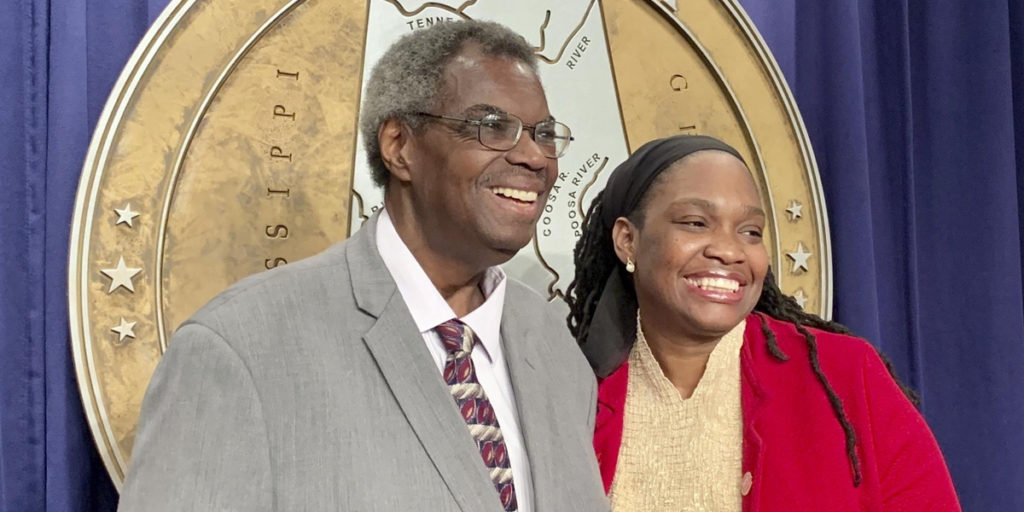
Former state legislator Hank Sanders announced Tuesday he is once again running for the Alabama Seat he held for nearly 40 years. The Senate seat is currently held by Sanders’ daughter, Malika Sanders Fortier, who has decided she is not running again, Sanders said. Sanders announced his retirement in 2018, paving the way for his daughter to run for the seat that represents Selma and surrounding areas. But Sanders said in a statement he has “unfinished business” in Montgomery, including pushing for Alabama to expand its Medicaid program to provide health care coverage to more people. “When I served in the Alabama Senate expansion of Medicaid was a critical focus for me. … I will work on this and other critical issues from elected office if I am elected again,” Sanders said. Sanders filed qualifying paperwork Tuesday with the Alabama Democratic Party, and the primary is in May. Sanders grew up in poverty as one of 13 children. He is a graduate of Harvard Law School who was first elected to the Alabama Senate in 1983. Republished with the permission of the Associated Press.
Bruce Boynton, who inspired 1961 Freedom Rides, dies at 83
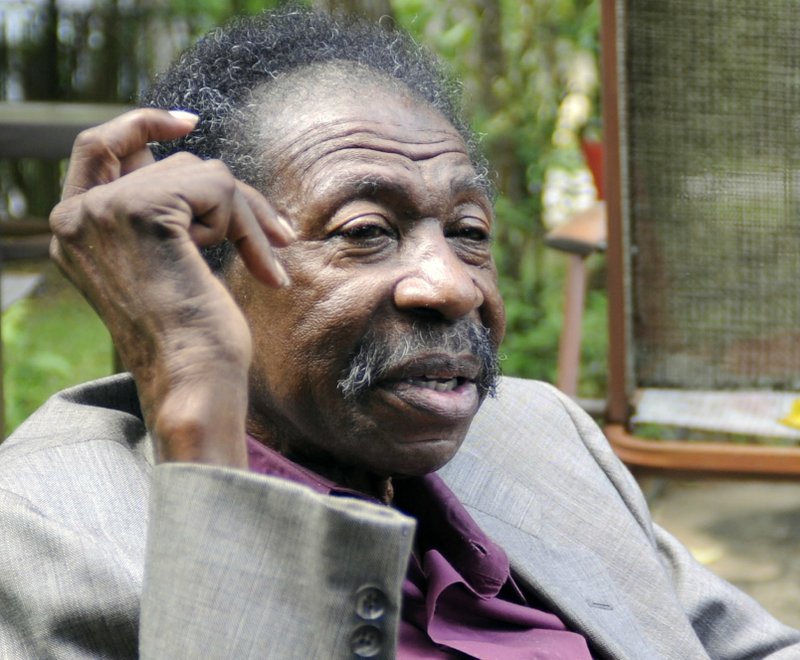
Bruce Carver Boynton, a civil rights pioneer from Alabama who inspired the landmark “Freedom Rides” of 1961, has died. He was 83. Former Alabama state Sen. Hank Sanders, a friend of Boynton’s, confirmed his passing Friday. Boynton was arrested 60 years ago for entering the white part of a racially segregated bus station in Virginia and launching a chain reaction that ultimately helped to bring about the abolition of Jim Crow laws in the South. Boynton contested his conviction, and his appeal resulted in a U.S. Supreme Court decision that prohibited bus station segregation and helped inspire the “Freedom Rides.” Despite his pivotal role, Boynton was not as well known as other civil rights figures. Yet both his mother and father were early civil rights activists. His mother, Amelia Boynton Robinson, was savagely beaten while demonstrating for voting rights in 1965 and was honored by then-President Barack Obama 50 years later. “He did something that very few people would have the courage to do. He said no,” U.S. District Judge Myron Thompson said of Boynton in 2018. “To me, he’s on a par with Rosa Parks,” the Black woman who refused to give up her bus seat to a white man. Boynton described his arrest in a 2018 interview with The Associated Press. Boynton was attending law school at Howard University in Washington, D.C. when he boarded a bus bound for Alabama in 1958. Public facilities including bus stations were separated by race across the South at the time, despite federal laws banning segregation in interstate travel. The bus pulled into a station in Richmond, Virginia, for a break, and Boynton went inside to eat. Seeing that the part of the restaurant meant for blacks had water on the floor and looked “very unsanitary,” Boynton said he sat down in the “clinically clean” white area. He told the waitress he would have a cheeseburger and tea. “She left and came back with the manager. The manager poked his finger in my face and said … move,’” using a racial slur, Boynton recalled in the interview. “And I knew that I would not move, and I refused to, and that was the case.” Convicted of trespassing, Boynton appealed and his case wound up before the Supreme Court. Thurgood Marshall, then the nation’s leading civil rights attorney and later on to become the first Black Supreme Court justice, was his counsel. Boynton contested his conviction and the Supreme Court ruled in 1960 that federal discrimination prohibitions barring segregation on interstate buses also applied to bus stations and other facilities linked to interstate travel. The next year, dozens of black and white students set out on buses to travel the South and test whether the ruling in the case, Bruce Boynton v. Virginia, was being followed. The “Freedom Riders” were arrested or attacked in Alabama, Mississippi, and South Carolina, and a bus was burned. Then-President John F. Kennedy ordered stricter enforcement of federal anti-discrimination laws. “He was a pioneer,” said Sanders. “All of the Freedom Rides sprung from this particular action.” Sanders said Boynton paid a price for what he did, and initially wasn’t able to get a law license in Alabama. He spent most of his career as a civil rights attorney before retirement. Thompson said in 2018 that Boynton’s life “is a teaching lesson for all of us about how we can make a difference.” “All he wanted was a cheeseburger, and he changed the course of history.” Republished with the permission of the Associated Press.
Group offers churches $6-a-ballot to help people vote early
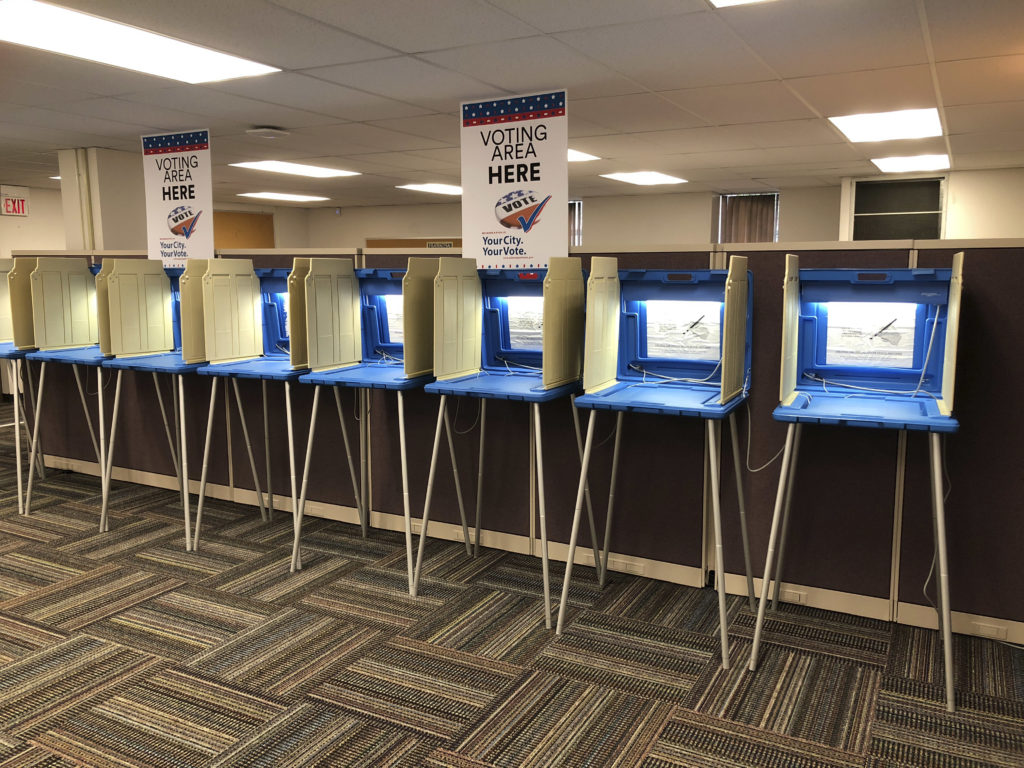
A group’s offer to pay churches $6 for every person they help to vote early this year does not violate any law although it might not be the “best practice” for getting out votes, Alabama’s elections chief said Monday. The “New South Souls to the Polls Initiative” is paying churches a $6 contribution “for each documented early vote” to cover the expenses for outreach and transportation to help people vote early by absentee ballot, according to a letter mailed to pastors by Hank Sanders, a former longtime Democratic state senator from Selma who is organizing the effort. It’s unclear how many churches were offered the funds. Sanders said the $6 is intended to compensate groups for transportation, outreach, and time to help people vote early and is not tied to how a person will vote. “It says specifically no person can be paid to vote. This is not about paying anybody to vote. It’s about trying to encourage people,” Sanders said in a phone interview. The New South Coalition is a predominately Black political group that is dedicated to the “progressive ideals of freedom, justice, and democracy.” Sanders said the effort is being run by the New South Alliance LLC, an entity dedicated to get-out-the-vote efforts. Absentee ballot requests have skyrocketed since the state office loosened rules because of the COVID-19 pandemic. People lined up Saturday in Birmingham and Montgomery to cast absentee ballots via in-person voting after local election officials offered Saturday balloting. A national Republican group backing Republican Tommy Tuberville in his bid to unseat incumbent Sen. Doug Jones criticized the $6 as a “cash for votes” scheme. Alabama Secretary of State John Merrill, a Republican, said he reviewed the situation and determined there is nothing nefarious as long as the $6 is not tied to voting a particular way. “It’s not illegal. It’s certainly not a best practice,” Merrill said in a telephone interview. “It does not say you are going to give it to someone to vote a particular way or vote for a particular party or to vote for, or against, a particular initiative, and so there is nothing there that is illegal.” The National Republican Senatorial Committee called it a “desperate and shady cash-for-votes scheme” and noted that a related organization, the New South Alliance, has endorsed Jones and Jones’ campaign has given money to the New South Alliance LLC. “Jones knows his radical message doesn’t resonate with Alabamians and has turned to dishonest campaign tactics to pay for votes,” National Republican Senatorial Committee spokesperson Paige Lindgren said in a news release. Sanders said the effort is in, “no kind of way tied to Doug Jones.” “It’s a shame that so many people don’t want other folks to vote,” Sanders. A spokeswoman for the Jones campaign said they “appreciate Secretary Merrill’s quick attention to this concern.” “While this practice is legal, the campaign does not condone it and strongly discourages it,” Jones campaign spokeswoman Lizzie Grams said. Republished with the permission of the Associated Press.


